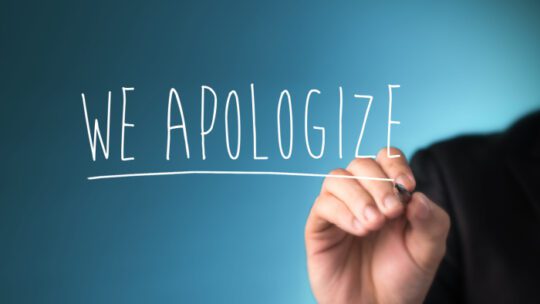
We’ve seen a trend over the last year of brands finding themselves in boiling water. Whether it’s the complete collapse of the business (Silicon Valley Bank), a terrible customer experience (Ticketmaster’s botched sale of Eras Tour tickets), or an insensitive social media post (Warner Bros.’ Barbenheimer tweets), the fall from grace is stressful. And, when you land at rock bottom, it hurts.
So how can a brand get up, dust themselves off, and most importantly, maintain its customers’ trust? The first step is a genuine, well-executed apology.
Retire the “Trust Bank”
Wes Bricker, PwC’s vice chair and U.S. trust-solutions co-leader, recently told Business Insider: “Trust isn't a luxury good. It's your everyday currency of business, and it's a nonnegotiable for long-term success.”
Essentially, your customers need to trust that you have their best intentions at heart for your business to succeed.
There are three core drivers of trust. The Harvard Business Review defines them as:
- Authenticity: realness, truth and transparency
- Logic: making sense to people
- Empathy: a genuine understanding of what other people are feeling
Brands used to believe they could build up a “trust bank” with their customers from which they could draw to fortify themselves during hard times.
But the days of tapping into a brand’s emergency fund are gone—and the most obvious example this year is SVB. SVB’s 40-year history of being a trusted financial brand evaporated overnight because their internal and external communications had holes (authenticity), their actions and words didn’t make sense to people (logic), and they didn’t appreciate the fear their customers would feel at the bank’s weakening (empathy).
If your company has faltered, look back at these drivers of trust. How can you incorporate them into all of your immediate and long-term strategies? Rebuilding brand trust is a marathon, not a sprint, and it all starts with a simple apology.
Apologize, Immediately and Thoughtfully
A good brand apology acknowledges responsibility for your mistake and includes actionable steps you plan to take to address the issue. It’s to the point and doesn’t make excuses or blame others. It incorporates the three core drivers of trust. And, it’s human.
A recent example of this that caught the attention of The Wall Street Journal was a refreshingly honest apology from the olive oil company Graza. During this past holiday season, many of Graza’s orders arrived to customers late and in less than jolly shape. Graza’s CEO & co-founder Andrew Benin sent an incredibly transparent apology email to 30,000+ affected customers, explaining what went wrong and offering a discount on future orders to make amends.
Benin deserves kudos for his apology letter because it was simple, straightforward and crafted as if he were writing to a friend. It wasn’t filled with business or marketing jargon and didn’t even include a link to Graza’s website. Benin ended up receiving nearly 1,000 responses from customers who thanked him for his honesty. One customer mentioned they’d be reordering Graza olive oil without using the discount code because of the genuineness of his apology.
In contrast, Ticketmaster’s immediate handling of Taylor Swift’s Eras Tour ticket sales is a master class in how not to apologize, given it all started with a non-apology. Frustrated only scratches the surface in describing how millions of Swifties felt after attempting to purchase tickets, only to be boxed out by bots and an underprepared system. At first, the entertainment conglomerate published a statement with an explanation of what went wrong—absent any apologetic language. This statement was quickly deleted, revised, and republished the following day with an apology to Swift and her fans. Still, the statement rang as tone deaf as it touted record-breaking sales versus empathizing with the concert goers.
The ticket debacle brought about a slew of other issues for Ticketmaster, including a Senate Judiciary hearing and fighting off monopoly accusations. While this continues to play out, the failed apology attempt will be what’s remembered.
Authenticity as a Business Driver
Today, consumers are savvier than ever. They have high expectations for brands and expect them to be authentic, which leads to trust. And authenticity is good for business: 70% of consumers reportedly spend more with brands they consider authentic.
If your brand finds itself in that boiling water following a gaffe, an apology is a solid start, but it’s merely step one in rebuilding consumer trust.
Beyond acknowledging your company values, brands have to live their values in every action, every product, every experience, and every communication to maintain the trust they covet the most.
Allison Logano is a vice president at Tier One Partners.
The writer's opinions are her own and do not necessarily reflect those of PRNEWS.
